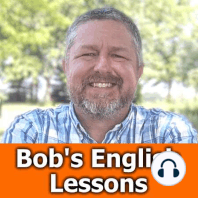4 min listen

Learn the English Phrases YOU GET WHAT YOU PAY FOR and ON THE MONEY
Learn the English Phrases YOU GET WHAT YOU PAY FOR and ON THE MONEY
ratings:
Length:
4 minutes
Released:
Oct 1, 2020
Format:
Podcast episode
Description
Read long to learn the YOU GET WHAT YOU PAY FOR and ON THE MONEYIn this English lesson, I wanted to help you learn the English phrase, "You get what you pay for." This is something we say to someone after they buy something where they didn't spend as much money as maybe they should have. A great example would be this. Let's say your friend is wanting to buy a used car, and they're looking at a Honda Civic. And a Honda Civic, let's say it is a 2010 Honda Civic. It's a complex story. And normally, 2010 Honda Civics go for $4,000, and your friend buys one for $1,000 and then a week later, it breaks. We would say, "Well, you know, you get what you pay for." So when you say the English phrase, "You get what you pay for," you're basically telling someone, if they are cheap, and if they don't spend enough money on something and it breaks, "Well, what were you expecting? "You didn't pay enough for the thing you bought. "You get what you pay for."The other English phrase I wanted to talk about today is the English phrase, "On the money." When you say that someone is on the money, you are saying that they are correct. Let's say you are in a meeting at work, and you say a few things during the meeting that everyone agreed with, you say a few things during the meeting that were very true and very accurate. After the meeting, someone might say to you, "Hey, Bob, in that meeting, "what you said was on the money. "You were on the money "when you said what you said in the meeting." So when you say that someone is on the money, it means that they are saying something that's true or accurate or correct. Oh, and to review, if you say you get what you pay for, you simply are saying to someone, "Hey, if you only pay $10 for a $50 item, "and later it breaks or it doesn't work right, "what were you expecting? "You get what you pay for."Hey, let's look at a comment from a previous video. This comment is from the video where I talked about the phrase, "Free rein". And this comment is from Oleg. It's a bit long, but let me read it. Oleg says, "The expression free rein originated "as horseback riding jargon, "referring to the act of holding the reins, "that's my little holding the reins action, "the straps by which a rider controls the horse loosely, "so as to allow the horse to freely move along "at its own pace and in its desired direction." By the way, that comment from Oleg, I have to give you the footnote, it is from the Merriam-Webster dictionary. And Panthera Nori responds and says, "Great note, thanks." Hi, Panthera. And then my response was, "Awesome, "thanks for researching the origin of this phrase. "It can really help people picture it "in their minds, good work." So sometimes when I teach phrases, I try to give the origin if I know it, but the funny thing with English is, there are so many phrases, and we don't know all the origins, and sometimes they don't even matter. Isn't that weird?We think about things like when we say, "Hold your horses," which probably means to pull the reins of the horse, or to give someone free rein, which is probably from the action of giving the horse freedom with the reins, as Oleg mentioned. By the way Oleg, thank you for leaving that comment. So the origin of these phrases and these idioms sometimes is a mystery even to us as native speakers, so it is cool to see sometimes the origin of where something came from. It's just really cool to see that.Support the show (https://www.patreon.com/bobthecanadian)
Released:
Oct 1, 2020
Format:
Podcast episode
Titles in the series (100)
Learn the English Phrases SPOILED BRAT and ROTTEN APPLE by Bob's Short English Lessons